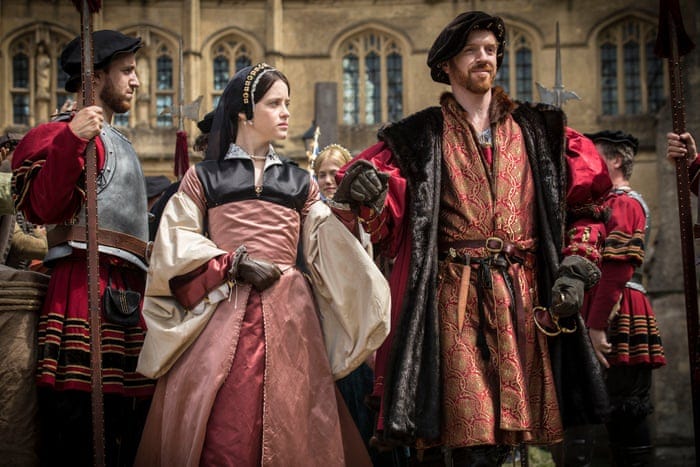The past is a foreign country
When did the world we live in begin? I argue for the 1500s. This is when European colonialism in the Americas takes off, when the trans-Atlantic slave trade begins, when crops and diseases and markets and people all become astonishingly, irreversibly globalized. It’s also when Wolf Hall takes place. I finished the TV series since I last recommended it, and I can’t stop thinking about it. (You will find no talk of the book here because as previously mentioned I couldn’t get through it.)
Wolf Hall is about Thomas Cromwell, who rose from a poor childhood to become a wealthy merchant and an important advisor to King Henry VIII (of six wives fame). In the series, he orchestrates the annulment of Henry’s first marriage to allow the king to marry Anne Boleyn, which brings along with it the separation of the Church of England from the Catholic Church of Rome. The way the show tells it (which may or may not line up with actual history, don’t @ me because I don’t care), this historic geopolitical shake-up is an inconsequential side effect to Henry, who is a spoiled brat willing to toss any person or principle into the garbage to satisfy his momentary whims. On the other hand, the opportunity to seed a political and religious separation from Rome is the reason Cromwell goes along with any of it, since he’s a secret (albeit pretty chill) Protestant in a society where that will still get you burned at the stake. But when Henry’s second marriage goes south and he insists that his advisors help him get out of it because what’s the problem you did it the first time, Cromwell is eaten up by the realization that he has no choice but to follow this narcissist down the path he himself has cleared until they both end up in hell.
A major theme of the show is that Cromwell—a capitalist, a Protestant, a commoner—is a modern man in a pre-modern age, dragging the world into the future with all his might. We know he wins because we live in that future, but he isn’t so sure how it’s going to turn out. Which brings me back to the clothes. I already called your attention to the bizarre hats, but 16th-century fashion in general is completely alien to modern tastes, with layers upon layers of clothes being built up until men look like bears and women look like hot air balloons.


I mean, what? The cheek-hugging headbands and wind-stocking hairnets don’t look so weird in period portraits, but slap them on Claire Foy and their strangeness really shines. And her version of Anne Boleyn is too trendy and chic to ever put on a gable hood, but it is truly one of the most shocking accessories I have ever seen.

According to costume designer Joanna Eatwell, the actors had to learn an entirely different way of being in their bodies to be able to handle these styles. (Also according to that interview, England was absolutely freezing at the time because of a period of global cooling, which partly explains the penchant for extreme layering.) You can’t don a stomacher and a gable hood—or, for the men, 20 pounds of furs—and continue moving through the world the way you do when you’re wearing athleisure. So to contemporary eyes, the whole thing looks…off. Other aspects of the production design also add to this sense of uncanniness, like the tapestries characters talk about like they’re photographs, or the candles that light up tiny portions of the screen at a time, or the retinue of musicians always lurking in the court’s corners and hallways to provide an on-demand soundtrack to noble lives.
The story and the characterizations do everything they can to make you identify with Cromwell, and to a certain extent Anne, who is also too modern for her time. But the clothes push you away. They remind you that while these people might have been just as complex and interesting as you psychologically, they lived in a context so unfamiliar it might as well be another planet. Cromwell and Anne are presented as our intellectual ancestors, but they can’t know what’s coming. They are trapped in their stomachers and furs, not quite able to articulate or fully realize the (positive and negative) changes they still managed to lay the groundwork for.
Wolf Hall, more than any other cultural product I can remember, adds texture back to the moment the modern world was being created, and to the people who did the creating. It leaves you with the uneasy knowledge that the world we live in was built for us by men in silly hats doing the best they could imagine and the worst they could get away with. It was never inevitable or fated. It was precarious and unlikely. And that, of course, means we can change it. We have to change it. When the future revisits us in 500 years, I expect we’ll seem just as strange and ambitious and unsteady as Cromwell, standing on the cusp of the world we’re creating but still can’t quite see.
My writing
This week I wrote about 16,000-year-old stone tools in Idaho, and what they might mean for how and when people came to the Americas. Covering this corner of archaeology has meant getting to watch a paradigm shift in action, which is certainly fun. But it bears repeating that science is just catching up with what Indigenous people have always known about themselves and their homes.
A programming note: My big article about my trip to Chiapas will be published next week! I’ll write more about it in my next newsletter, so stay tuned. I’m really excited about this one.
Recommendations
“The American Missionary and the Uncontacted Tribe.” The definitive longform story about the American missionary who was killed in the Andaman Islands last year. I went back and forth between finding this article fascinating and enraging, and I hated the ended. But it’s still a tour-de-force of the form of taking a throwaway news story and going really deep.
Trick Mirror. This book of essays is so good that I want to throw it across the room and then jump into a volcano so I never have to write another word and be reminded that I will never, ever be Jia Tolentino.
Lil Nas X at the VMAs. These outfits, especially the first one, instantly tipped me over from distant admirer to tears-in-my-eyes stan. We are not worthy of Gen Z.


